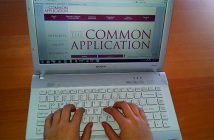 (Photo: Alberto G., Creative Commons)
(Photo: Alberto G., Creative Commons)
A newly-released report from New America takes a closer look at research on the assessment of college learning. Written by Fredrik DeBoer, the paper focuses on the push for additional assessment and data collection throughout higher education and discusses the backlash that results.
DeBoer begins the report, titled “Standardized Assessments of College Learning: Past and Present,” by discussing the increase in standardized testing that is taking place in K-12 schools across the country. However, he says this is not the case for American universities, which are not subject to legal and infrastructural pressures that cause standardization and homogeneity to occur. In fact, he writes that universities are typically individual entities that function on their own. This makes it especially difficult to assess college learning and to coordinate and standardize any assessments.
He goes on to discuss the concerns involved with tracking assessment data for higher education. Specifically, he notes the lack of history involved with any sort of comparative assessment of schools or programs. While tests exist to compare individual students, the same cannot be said of universities and their programs. Many educators have shared their concerns pertaining to the consequences of creating such a system, which they say would bring an end to faculty control over curriculum and flexible, content-specific teaching.
Some suggest that implementing any sort of assessment system would cause faculty to begin to “teach to the test” and could result in test fraud. Others argue that such a system would require the expenditure of valuable resources while institutions are already feeling pressured to “tighten their belts.”
DeBoer has several recommendations concerning the development of an assessment for higher education.
First, he suggests that standardized tests used in higher education must be subject to external validation. While he says there is a need for some test security when it comes to test development in order to keep certain secrets, ultimately he writes that test developers need to understand that it is only through a truly independent verification that public confidence can be built concerning the validity, reliability, and fairness of their exam.
The report says that faculty and local administration must be offered to be a part of the assessment process. Advocating for turning disciplinary assessment over to faculty and their departments, DeBoer suggests that faculty be assured that they will have a say in the key decisions that go into creating a comprehensive assessment plan in order to have those faculty members see themselves as partners rather than targets, which he says will create effective relationships and lasting assessment programs.
DeBoer also suggests that assessments not be high stakes, but at the same time, they need to have some sort of stakes attached. He writes that assessments are only valuable when they are used to make improvements upon institutions, and so, assessment data should be carefully reviewed to determine areas of strength and need and where groups of students are seeing unequal outcomes.
He suggests that most importantly, assessments can be used to see how well public resources and tuition dollars are being put to use.
Report Suggests Standardized Assessment of College Learning
0
Share.




